After street parties, Hasidic movement’s emissaries fan out across NYC in ‘mitzvah tanks’ to give out matzah as part of festivities memorializing Rabbi Menachem Mendel Schneerson
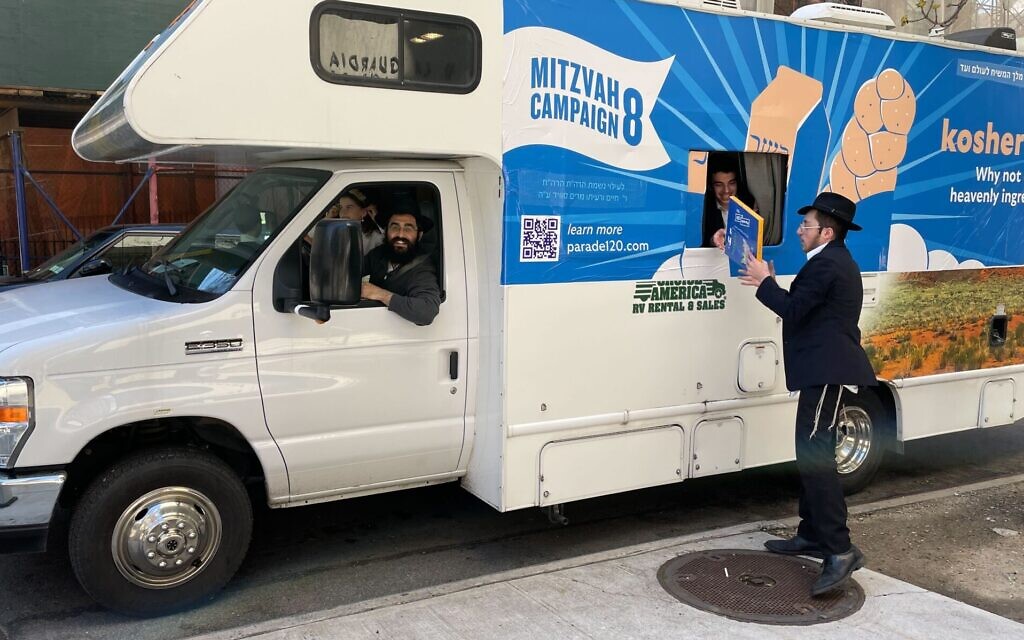
JTA — A massive rally and concert drew 15,000 people to the streets of Crown Heights, Brooklyn, on Sunday night. On Monday, a different late-night party spilled into the streets of Queens.
And, on Tuesday, 120 “Mitzvah Tanks” fanned out across New York City to distribute matzah for Passover and give passersby a chance to complete Jewish rituals, while back in Crown Heights, children were feted for their success in memorizing millions of lines of Jewish texts.
The local festivities were among the largest and splashiest of a global 120th birthday bash for Rabbi Menachem Mendel Schneerson, the Chabad-Lubavitch Orthodox movement’s last leader, who died in 1994, and the figure whose life and mythology continue to animate the movement’s followers today.
Among those celebrating Schneerson — known as the Rebbe to his followers — were the thousands of Chabad adherents spreading his message as emissaries around the world; Jews who participate in Chabad activities but are not affiliated with the movement; politicians and public officials, and even non-Jewish celebrities who have been inspired by his example.
“Today is the 120th birthday of the Rebbe Schneerson, the preeminent spiritual leader from whose teachings and lessons I’ve gained inspiration over the years,” the model Naomi Campbell, a longtime Schneerson fan who is not Jewish, posted on Instagram, along with a portrait of a smiling Schneerson and a picture of herself praying at his grave.
“In tribute to his tremendous legacy, I will spend a moment of silence today thinking about the infinite potential that God has blessed us each with to better the lives of others and create a more meaningful world,” Campbell added. “What’s your tribute?”
Chabad treats Schneerson’s birthday — the 11th day of the Hebrew month of Nisan, which this year fell on Tuesday — as a holiday every year, using it as a springboard for outreach and for a political movement to bring a moment of silent reflection to American schools. US President Joe Biden, as his predecessors have done since 1978, issued a proclamation this year honoring the birthday as “Education and Sharing Day.”
“The rebbe’s devotion to educating people worldwide and his profound respect for diversity, inclusiveness and equal justice have set a strong example for generations of Americans and people across the globe,” Biden said in the proclamation, which was accompanied by state and local versions across the country.
This year the international Chabad community pulled out extra stops for Schneerson’s birthday because of the special significance of 120 in Jewish tradition. Moses was 120 when the Bible records his death, and that age is considered the ideal duration of a good life. “To 120 years” is a traditional accompaniment of birthday greetings for many Jews, especially in Orthodox communities.
To mark the occasion, Chabad has hosted weeks of events on at least five continents, from parties in Buenos Aires and Los Angeles to a conference in Washington, D.C., that drew lawmakers from across the political spectrum. It also launched a host of new education programs and vowed to open more than 1,200 new institutions — synagogues, schools, camps, ritual baths and more — over the next year in Schneerson’s honor.
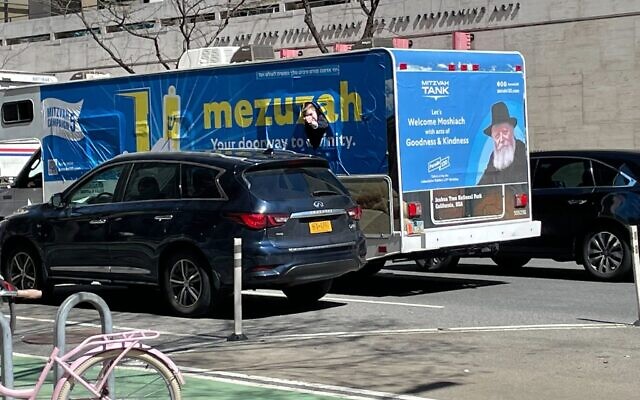
Birthdays are a big deal within Chabad in part because Schneerson, who died in 1994 at age 92, himself encouraged their celebration, something that is not always widely done in Orthodox communities.
This year’s milestone birthday is even more resonant for the movement because some of Schneerson’s followers do not put much stock in his death. In fact, the movement, which aims to connect Jews with Judaism and Jewish practice worldwide, includes adherents who believe that Schneerson was the Messiah — and has experienced tension between them and those who revere Schneerson as a powerful but ultimately mortal figure.
Schneur Zalman Newfield, a sociologist and former Lubavicher who has studied people who have left Chabad and other Orthodox movements, noted that the movement’s official videos tend to elide the question of whether Schneerson is dead by interweaving his speeches with contemporary footage to give the impression that he is speaking to current audiences.
That is in some ways in keeping with the way that Jews of all backgrounds think about the Torah, which was written — some believe divinely — thousands of years ago but continues to play an active role in Jewish life, said Newfield, who teaches at CUNY’s Borough of Manhattan Community College.
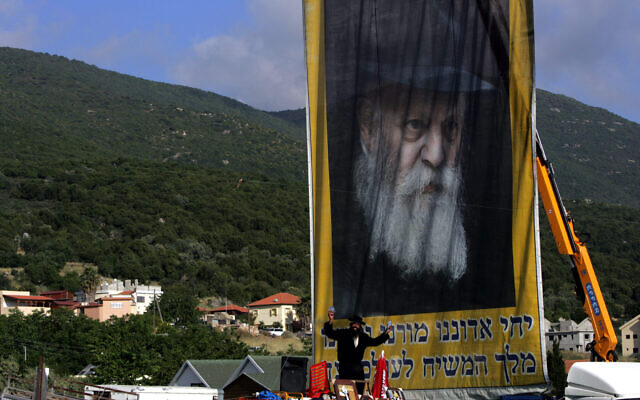
“The issue of whether the rebbe is literally alive or whether he will come back as the messiah — they are separate from the issue of the rebbe’s continued life in the movement,” he said.
Indeed, whether or not Schneerson was the Messiah — and he never said he was not, many of his followers argue — it’s undeniable that under his leadership and inspiration, Chabad transformed from an insular sect decimated by the Holocaust into one of the most widely known expressions of Judaism today.
Born in Ukraine in 1902, Schneerson lived there for much of his early life, then lived in Berlin and, after Adolf Hitler came to power in 1933, France, before escaping to the United States in 1941. After his father-in-law, the sixth Chabad rebbe, died in 1950, he became the sect’s leader and, over time, one of the most influential figures in contemporary Judaism.
Leading the movement from 1951 until his death, Schneerson was a prolific speaker who is survived by thousands of recordings and photographs, documenting his interactions with various people as well as his philosophy on worldly and Jewish matters.
“He is certainly the most videoed Jewish leader in our history,” said Maya Balakirsky Katz, a professor at Bar Ilan University who wrote a book titled “The Visual Culture of Chabad,” and has spent countless hours at Chabad’s multimedia archive.
The recordings — nearly 11,000 hours in total — make up a canon that has helped preserve Schneerson’s influence in his absence.
“We have almost every word. There may have been other Jewish teachers who have been more prolific but we don’t have a record of that,” said Motti Seligson, Chabad’s director of media relations. “From the rebbe we do.”
Today, thousands of rabbinic couples operate Chabad houses, and associated enterprises, in communities around the world, including in many places where there is no other organized Jewish presence.
In many countries, including Schneerson’s native Ukraine and in Russia, Chabad dominates Jewish life and supplies the officials who represent Jewish interests to the government. (In Ukraine, Chabad emissaries are both evacuating Jews and serving those who remain after Russia’s invasion in February.)
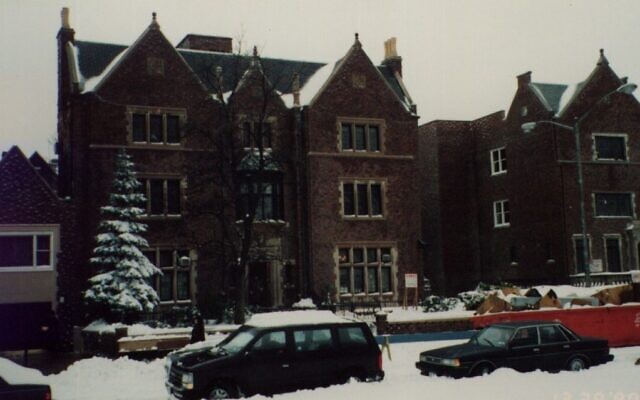
Even in the United States, with its robust and developed Jewish communal infrastructure, nearly 20% of Jews across denominations say they participate in Chabad activities, according to the 2020 Pew Report on Jewish Americans. Americans of all backgrounds encounter the distinctive straight-branched Hanukkah menorahs erected by local Chabad emissaries in public spaces.
Meanwhile, the movement’s headquarters in Crown Heights is a bustling hub of activity at all hours, its centerpiece building, 770 Eastern Parkway, replicated around the world. (Followers there danced all night on Schneerson’s birthday.) And Schneerson’s gravesite in Queens is a pilgrimage site for his followers from the world over, especially those seeking good fortune in marriage and child-bearing. A trip there is considered de rigueur in announcing engagements among his followers, and the site saw “endless streams” of visitors for the entire 24 hours of Schneerson’s birthday, according to a website serving Chabad emissaries.
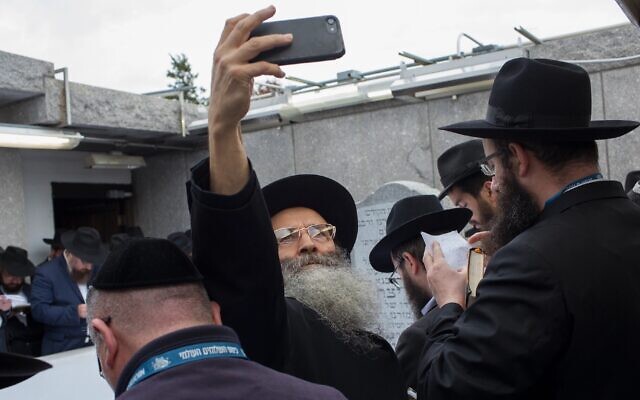
Chabad’s supporters say the most significant measure of Schneerson’s impact is not in the number of followers he has, or what they believe about his status today, but about the good he has inspired.
For Chabad, that impact is measured largely through the completion of mitzvahs, or commandments under Jewish law, that can range from praying regularly to cleaning one’s home for Passover to giving charity. For this reason, a core activity for boys studying in yeshiva is street-level outreach in places where there may be Jews who do not pray daily or celebrate Shabbat or holidays in traditional ways. By convincing such Jews to perform even one additional mitzvah — strapping on tefillin for men, say, or lighting Shabbat candles for women — they are fulfilling Schneerson’s vision.
The group has asked its followers to commit to new observances in honor of Schneerson’s birthday and says nearly 100,000 have so far done so, many of them recording their promises on a website called OneMitzvah. Through Chabad of Norwood, in Johannesburg, South Africa, for example, Tessa Rosendorff pledged Tuesday to go to synagogue on Shabbat 18 times. “Happy birthday to the rebbe,” she wrote in her submission.
Children in 135 Chabad schools around the world — mostly in the United States, Israel, France and Australia — collectively memorized millions of lines of Jewish texts in honor of Schneerson’s birthday. They were feted at a celebration centered around a rally in Crown Heights on Tuesday.
“You proved today that you really loved the rebbe,” Rabbi Shimon Hecht, who leads Chabad’s efforts in Park Slope, Brooklyn, told them. “Because you came out here even though it was raining and you said, ‘Rain or shine, it’s the rebbe’s birthday. We are going to celebrate the rebbe’s birthday the way the rebbe wants us to do it.’ And you know what? Because you came here today the rebbe is going to bless us all here and all the children throughout the world.”
As reported by The Times of Israel
